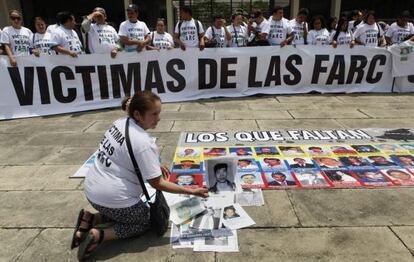FARC chief says peace agreement will not happen this year
Colombian President Santos is eager to sign an accord with the guerrilla group by the end of 2014

As President Juan Manuel Santos and leaders of the Revolutionary Armed Forces of Colombia (FARC) prepare to meet in Havana to discuss ways to compensate more than six million victims, FARC chief Rodrigo “Timochenko” Londoño Echeverri has warned that the parties may not sign a peace agreement this year.
In an interview published on one of the guerrilla group’s websites, Timochenko said they must be “objective” about the end date of the peace process. According to his estimates, this new round of talks will last at least four months. “The Historical Commission is in charge of designing a reconstruction of the conflict over a four-month period that starts on August 21,” he said. “The result will provide the material for the discussion on victims. If we take that fact into account, it’s easy to come to the conclusion that there is not enough time left in the year.”
The Colombian government and the rebel group established the Historical Commission of the Conflict and its Victims (CHCV) to help shed light on the complexity of the armed struggle. The parties said CHCV reports that examine the origins and impact of the internal conflict on the nation will serve to advance peace talks. These reports include papers on victims’ rights and on thorny issues such as disarmament and rules for a bilateral ceasefire. FARC leaders and the Colombian government have reached agreements on agrarian reform, political participation and drug trafficking.
Colombians are calling for the Havana negotiations to be sped up because the armed conflict continues
This week the country will be following closely as the victims take direct part in the Havana negotiations. The first 12 members of a 60-person victims group will travel to Cuba on Saturday. These representatives, chosen by the United Nations and the National University, have provoked a heated debate. Fabrizio Hochschild, UN coordinator in Colombia, has told EL PAÍS that the UN wants these delegates to “represent the plurality of the country in terms of region, types of crimes suffered and perpetrators involved.” The identities of the men and women who will face the FARC negotiators in Cuba have not been revealed.
“Ideally the victims themselves will help define what they consider justice,” Timochenko said in that recent interview.
Meanwhile, the pace of discussions worries the Santos administration because the president wants to sign an agreement by the end of this year. Colombians are calling for both parties to speed up negotiations because the armed conflict continues even as talks are held in Havana and civilians are caught in the crossfire. In light of recent guerrilla attacks that have left several towns without electricity or water, President Santos has asked the rebels to keep civilians out of the conflict. “The patience of the Colombian people and the international community is not infinite,” he said in his inauguration speech on Thursday. Santos urged FARC rebels to take “peaceful actions.”
While the parties negotiate reparations for the victims, both sides have agreed to speed up the peace process by creating a subcommission made up of 10 representatives from each delegation to discuss the next point on the agenda – a definitive ceasefire and disarmament of the rebels. The group will begin meetings on August 22 and Timochenko has warned that the talks “will not be easy.”
Translation: Dyane Jean François
Tu suscripción se está usando en otro dispositivo
¿Quieres añadir otro usuario a tu suscripción?
Si continúas leyendo en este dispositivo, no se podrá leer en el otro.
FlechaTu suscripción se está usando en otro dispositivo y solo puedes acceder a EL PAÍS desde un dispositivo a la vez.
Si quieres compartir tu cuenta, cambia tu suscripción a la modalidad Premium, así podrás añadir otro usuario. Cada uno accederá con su propia cuenta de email, lo que os permitirá personalizar vuestra experiencia en EL PAÍS.
En el caso de no saber quién está usando tu cuenta, te recomendamos cambiar tu contraseña aquí.
Si decides continuar compartiendo tu cuenta, este mensaje se mostrará en tu dispositivo y en el de la otra persona que está usando tu cuenta de forma indefinida, afectando a tu experiencia de lectura. Puedes consultar aquí los términos y condiciones de la suscripción digital.








































